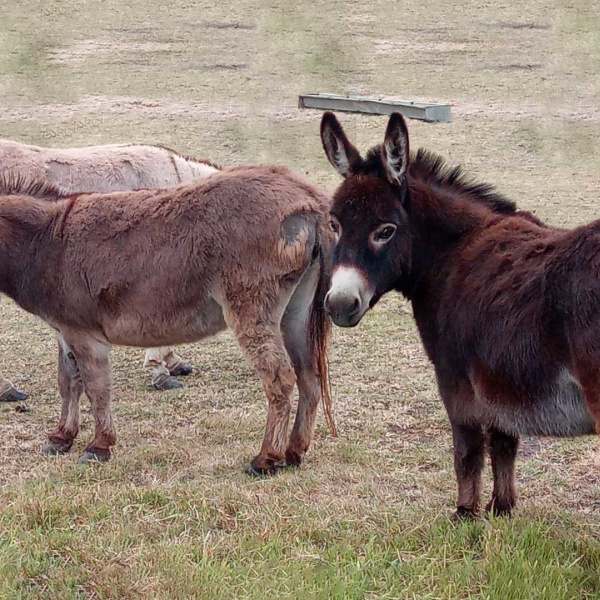A pair of grossly overweight Miniature donkeys with twisted and overgrown hooves are now thriving in the care of international animal welfare charity The Donkey Sanctuary.
Donkeys Penny and Chelsea were discovered at a site in North Devon in June 2020. When Donkey Welfare Adviser Jenna Goldby first arrived, she could see that both donkeys were in an obese body condition and needed urgent veterinary attention to avert a potentially fatal situation.
Thirteen-year-old Penny’s hooves were in a horrendous state and showed signs of laminitis, a painful hoof condition. Her companion, a 10-year-old donkey called Chelsea, also had overgrown hooves.
Jenna said: “I was mainly concerned about Penny’s hind hooves, as they had a considerable twist that resulted in her walking on the outside of the hoof.
“The deformity of the hooves much have been causing incredible pressure on the ligaments and tendons in Penny’s legs.
“Penny’s front hooves were also overgrown and showed abnormalities that are commonly associated with laminitis. I was concerned she was in pain, so it was important that she was examined by a vet as soon as possible.”
Jenna was concerned that Penny and Chelsea were both extremely overweight after observing that the donkeys had large rolls of fat covering their necks and pendulous bellies.
In donkeys, there is a much higher risk of an overweight donkey developing a condition called hyperlipaemia, which is caused by too much fat in the blood and can be fatal, especially if not treated promptly.
Obesity can also lead to laminitis, as well as putting additional strain on the organs and the joints.
The pair were living with a group of other donkeys, all of whom were overweight. But as soon as Jenna spotted Penny and Chelsea, she realised there were other issues to address as well as obesity, and immediately called an external vet to the site.
The vet carried out a full examination of Penny and Chelsea and explained the severity of Penny’s hoof abnormalities would result in her requiring years of farriery care to correct the deformities and continue to keep her hooves balanced in the correct way.
Jenna discussed Penny and Chelsea’s ongoing care needs with the owner, and it was agreed it would be in the donkeys’ best interests for them to be relinquished into the care of The Donkey Sanctuary.
Penny and Chelsea are now progressing well at the charity’s Brookfield Farm near Honiton, Devon and now have a safe home for life in the care of The Donkey Sanctuary.
They have both gradually lost the excess weight under the guidance of a vet and have a healthy body condition.
However, the pair have been left with irreversible damage to their hooves. Chelsea required pain relief and remedial farriery when she arrived, but her long-term prognosis is better than Penny’s, who has chronic laminitis and now wears plastic shoes to support her hooves.
The Donkey Sanctuary has also worked with the owner to make changes that would support weight loss in their other donkeys, and they continue to work with a local vet to monitor their progress.
For interviews, images and information please contact The Donkey Sanctuary press office on 01395 573124 or 07870 849563 (including out of hours) or send an email.
The Donkey Sanctuary is the world's largest equine welfare charity. Our vision is a world where donkeys and mules live free from suffering and their contribution to humanity is fully valued. We run 10 sanctuaries around the UK and Europe, giving lifelong care to more than 7,000 donkeys and mules. Our hospital treats sick donkeys and trains vets both nationwide and worldwide. Our donkey-facilitated learning programme helps vulnerable children and adults develop life skills by connecting with donkeys on an emotional and physical level. The charity operates programmes worldwide for animals working in agriculture, industry and transportation, and those used in the production of meat and skin.
Please note that the name ‘The Donkey Sanctuary’ should not be abbreviated to ‘Donkey Sanctuary’, and the word ‘The’ should always appear with a capital ‘T’ as above.
